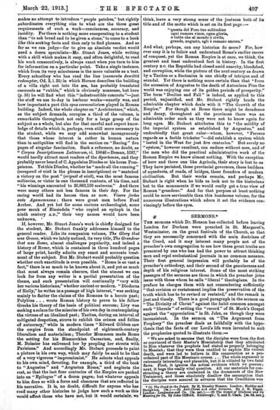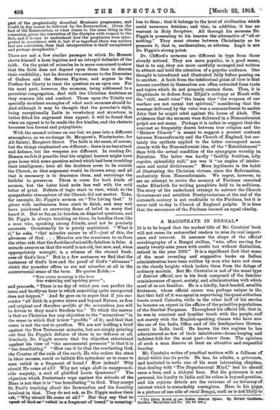SERMONS.*
THE sermons which Dr. Henson has collected before leaving London for. Durham were preached in St. Margaret's, Westminster, on the great festivals of the Church, so that
they are necessarily concerned with the main doctrines of the Creed, and it may interest many people not of the
preacher's own congregation to see how these great truths are presented by one who has had the power to attract thinking men and repel ecclesiastical journals in no common measure. Their first general impression will probably be of the preacher's orthodoxy, and their second of the genuineness and depth of his religious interest. Some of the most striking passages of the sermons are those in which the preacher joins issue with those whom he calls "liberal" theologians. In the preface he charges them with not remembering sufficiently " that revision or restatement implies the preservation of the
truth which has to be revised or restated," and the remark is just and timely. There is a good paragraph in the sermon on " The Divinity of Christ" against the habit common amongst such " liberals " of setting the " record " of St. Mark's Gospel against the " appreciation" in St. John, as though they were inconsistent. In the sermon on " The Argument from Prophecy" the preacher deals as faithfully with the hypo. thesis that the facts of our Lord's life were invented to suit the prophecies quoted to illustrate them:-.
" We are asked to assume that the disciples were from the first so convinced of their Master's Messiahship that they attributed to Him whatever the prophets had stated as properly belonging to Messiah; that they were thus enabled to explain His violent death, and were led to believe in His resurrection as a pre. ordained part of His Messianic course. ... The whole argument is extremely interesting and plausible, but it is vitiated by two fatal flaws. First, it ignores the actual evidence which wo possess; next, it begs the really vital question. All our materials for con- structing a theory are contained in the documents of the New Testament, and these absolutely disallow the assumption that the disciples were assured in advance that the Crucifixion was • (1) The Creed in the Pulpit. By H. Hensley. Henson. London : Hodder and Ston.ghton. [6e.]—(2) Anti-Christ asd other Sermons. By J. N. Figgie. London : Lonsmans and Co. [5s. net.]—(3) The Gospel of Gladness and its xeciningf9r Us. By John Clifford. Edinburgh; T. and T. Clark. [4s. Ecd. net.] garb of- the prophetically described Messianic programme, said would in due course be followed by the Resurrection. Given the fact of the Resurrection, or what comes to the same thing in this connexion, given the conviction of the disciples with respect to the fact, and it is easy to understand how the prophecies were inter- preted in accordance with it, bat if' et* kypothesi there was neither fact nor coaviction, then that interpretation is itself unexplained and perhaps inexplicable," There. are not a few similar passages in which. Dr. Henson shows himself a keen logician and anintrepid- defender of the faith. On the-pointed miracles he is morecoricerned.toshow that the faith does not depend upon them than to discuss their credibility; but hedevotes two setmons to the Demoniac of Gadarsi and the Barren Fig-tree, and argues' in 'the Preface for liberty to-treat the question as an open one. For the most part, however, the sermons, being addressed to a parochial congregation, deal with the Christian doctrines m they concern life and conduct. Those upon the Trinity are specially excellent examples:of .what such sermonashmild be Anclalthough it may be thought that the preacher's style, being exceptionally Latin in vocabulary and structure, is better fitted for argument than appeal, it will be-found that when an appeal is to be mide.-the fire kindles, and the rhetoric becomes less formal and polysyllabic.
With the second-volume on our list; we pass into a different atmosphere, as we exchange St. Margaret's, Westminster, for All Saints, Margaret Street. The faith is the same, of course, but the things emphasized -are different ; there is no less attack and. defence, but the weapons are different. In reading Dr. Henson we felt it possible-thathis original hearers might.have gone home with some .question solved which had been troubling their intelligence; here all the doubters' seem to be outside the Churob, so that argument_ would be thrown away, and all that is- necessary is to denotmce them, and encourage the faithful to persevere. There is room, for. both. kinds of sermon, but the latter -kind silks less well with the cold letter of print. Defects. of logic start to view, which in the sympathetic atmosphere of the Chuich did not matter. Take, for example, Dr. Figgie's' sermon On " The Living God." It glows with enthesiasm from start to finish, • and may well have quickened an answering flame of belef in many that heard it. But so fangs he, tauchesem.disputed questions, and Dr. Figgie is always touching on.them, he handles them like a man who, speaking among friends, need not be precisely accurate: Occasionally he is purely • sophistical. " What is it," he eekte, "that' miracles assure 'us ?--just of this, the aliveness of God. . . Vieacles are the assurance to us from the Other side that the-doctiineof scientific fatalism is false. A miracle assures 'us lliatthiwbild-iinob old, but new, and; when appropriately wrought; is a witness of the eternal fresh- nesseef God's. love." But in a' few sentences we Ilidthat the instaneee of God's '1Ove,and the' proof of God's " aliveness " which the treacher (lifers 'us are not miracles- at all in the conlatatersial senseef 'the term. He quotes Keble "-New-every morning lathe love
Our eashenhig and uprising prove ";
and proceeds, " There is no day Of which you can predict the issue, end ' hefillyan herat in-wiiieh something quite unexpected dues tot happen." And lie goes on to argue that if you sur- render "All' faith in a.pOwee above Mid-beyond Nature, as free and original and therefore -prolific of the miraculous, you will be driven to deny man'a freedom too." To which the answer is that no Christian has 'any objection to' the "miraculous " in the sense-in which God iiitioar "-prolific " of it ; and that that sense is not the onain question. We are- not holding a brief against the New Teatinnent'abiiacles, -but areesiniply pointing out that Dr. Figgie's defence' of theta: is- no-defence at all. Similarly, Dr. Figgie; asserts that 'the Objection entertained against his 'view 'of "the sacramental presence" is that leis "too humiliating." "How can it be that the everlasting. God, the Creator of the `ends of the earth, He ivho- orders the stars in their courses, could so belittle-His splendour ace to come to man veiled- in a' fragment of bread ? How indeed:? Why sheuld He come at-ill? Why not reign aloft in unapproach- able majesty, . a _sort of glorified Louis Quatorze ? " The objection which Protestants urge against the miracle, of the Mass is not that it "'too humiliating to God. They accept' St. Paul's teaching about the Incarnation and the humility_ involved- in that. They do not ask, as Dr. Figgie makes theta salt; "-Whyslicauld wine at all'?" Bute they say that/to sysekAd gmds veiled: in- at fmgMent, of bread," is meaning= less to thein ; that it belongs to the level'of Civilization which could reverence fetishes; and that, in addition, it has-no warrant' in Holy Scripture: All through his sermons Die Figgie is- presenting' to his hearers thes alternative of "ell nothing." They must choose between Christianity as he presents it, that is, mediaevalism, or atheism. Logic is not Dr. Figgie's strong point.'.
Dr. Clifford's sermons • are "different in type from thmie already noticed. They are more popular, in n good sense; that is to say, they are more carefully 'arranged and written to attract and hold the attention of a popular audience. One thought is introduced and illustrated fully before passing on to another. A fault from the intellectual piaint of view is that lessons excellent in themselves are often extracted from texts and topics which do not properly contain them. Thus, it is illegitimate to deduce from Elijah's colloquy at Horeb with the "still, small voice" the lesson that "the weapons of our warfare ate not carnal but' spiritual," considering that the message' delitered by the voice was a commandment to anoint Jelan -that- he might-rebel against the house of Ahab. The evidences that the sermons were delivered in a Nonconformist pulpit are not many. Perhaps it is unfair to suggest that the contrast so frequently drawn between true religion and the "Hebrew Church " is meant to suggest a present contrast between Nonconformity and the Church of England, but cer- tainly the epithets applied to the latter correspond more closely with the Nonconformist idea of the "Establishment than with the actual condition of the synagogue worship. in; Palestine. The latter was hardly -" faultily faultless, icily, regular, splendidly null," nor was it ""an engine of intolere ance and social divisiveness." More legitimate is the habit of illustrating the Christian virtues, since the Reformation, exclusively from Nonconformists. We regret, however, to see an attempt to revive the memory of Puritans executed' under Elizabeth for writing pamphlets held to be seditious.. The story- of the underhand attempt to subvert the Church Government and establish Presbyterianism at the end of the• sixteenth century is not creditable to the Puritans, but it is never told to-day in Church of England* pulpits. It is time that the successors of the Piuitans learned an equal charity.















































 Previous page
Previous page